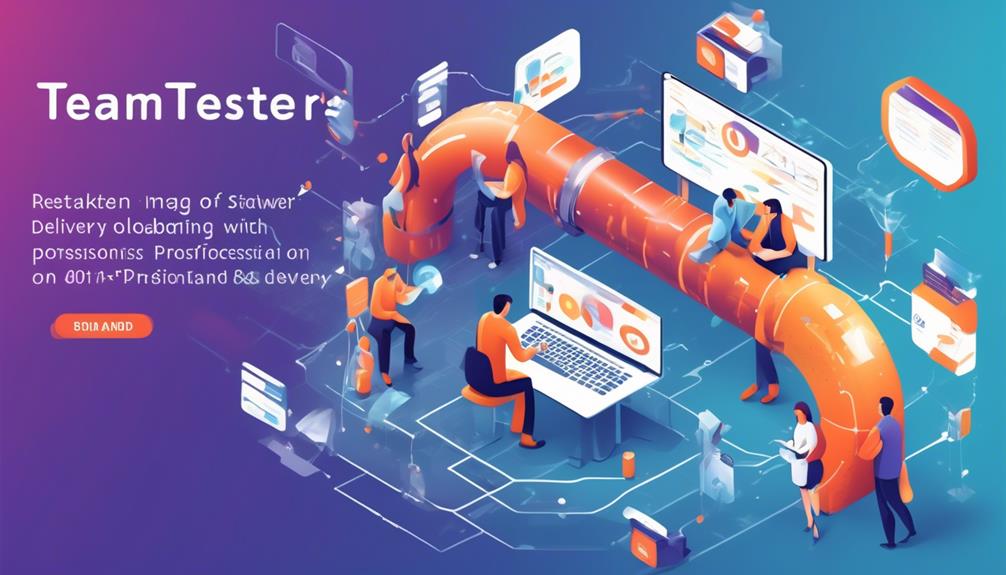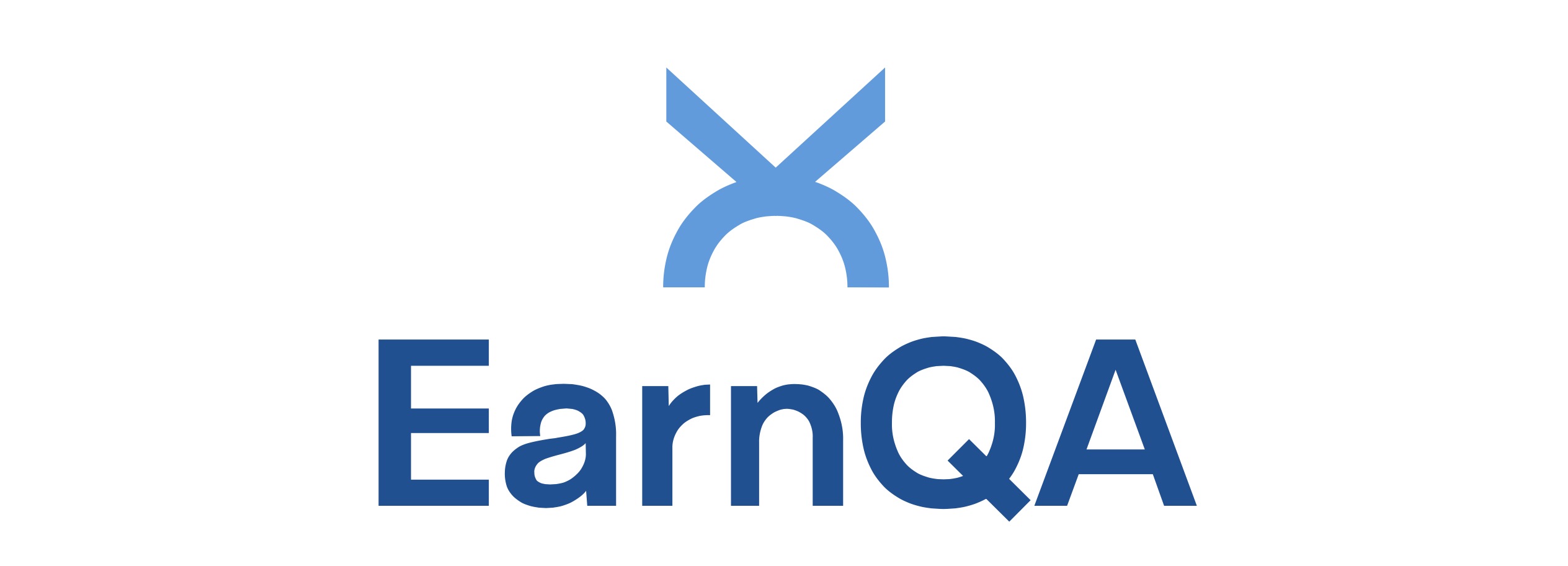Advanced Topics in SQA
Revolutionizing DevOps: How SQA Guarantees Agile Quality Delivery in the Fast-Paced Tech World!
SQA in DevOps ensures agile quality delivery. Learn how to integrate software quality assurance into the DevOps process for efficient and high-quality software development and delivery.

In the constantly changing world of software development, merging Software Quality Assurance (SQA) with DevOps is crucial for ensuring reliability and efficiency, thus enabling the prompt delivery of top-notch products.
The seamless integration of QA activities at every stage of the development cycle symbolizes the commitment to delivering high-quality software. However, the complexities and intricacies of this integration pose both challenges and opportunities, making it crucial for us to explore the strategies, methodologies, and innovations that drive SQA in DevOps.
Join us as we unravel the significance of SQA in DevOps, confront the challenges of agile quality delivery, and uncover the strategies that blend SQA seamlessly with DevOps methodologies to drive innovation and excellence in software quality.
Key Takeaways
- SQA in DevOps facilitates continuous testing and enhances overall software quality through automation and testing at every stage.
- Collaboration and communication between teams are crucial for seamless agile quality delivery.
- Continuous testing, automation frameworks, and regression testing are essential for successful CI/CD in DevOps.
- Blending SQA with DevOps methodologies involves integrating QA practices into development and operational processes, establishing continuous feedback loops, and fostering a culture of shared responsibility for software quality.
Significance of SQA in DevOps
Implementing SQA in DevOps is crucial for ensuring the seamless integration of quality assurance practices into the agile and continuous delivery workflows. In DevOps, the significance of SQA lies in its ability to facilitate continuous testing, ensuring that quality isn’t compromised during rapid software development and deployment.
By integrating QA processes into DevOps, we harness automation to conduct tests at every stage of the software delivery pipeline, thereby enhancing the overall quality. This collaboration between QA and DevOps teams is essential for maintaining high-quality standards throughout the development lifecycle.
DevOps emphasizes a shared responsibility for quality, where QA plays a critical role in establishing and maintaining quality gates, conducting code reviews, and fostering a culture of continuous improvement. The continuous feedback loop between QA and development teams is a cornerstone of DevOps, enabling timely insights into code quality and sharing best practices.
Collaboration and communication are pivotal in DevOps testing, as they ensure that all teams are aligned and working towards the common goal of delivering high-quality, reliable software. Ultimately, the integration of SQA in DevOps is pivotal for achieving agile quality delivery, where quality isn’t just a phase but an intrinsic part of the entire software development process.
Challenges in Agile Quality Delivery

Challenges arise in agile quality delivery as we navigate the integration of SQA into DevOps workflows, emphasizing the need for seamless collaboration and communication between QA, development, and operations teams. In DevOps environments, ensuring quality isn’t solely the responsibility of the QA team; it’s a shared responsibility across the entire development and operations teams.
Continuous Integration and Continuous Delivery (CI/CD) demand a change in approach to the role of QA in DevOps, emphasizing collaboration and communication skills. Implementing CI requires a robust shift-left testing approach, where testing is performed earlier in the development cycle. This shift necessitates continuous feedback and collaboration between QA and development teams.
Regression testing and the establishment of automation frameworks become vital to support the pace of continuous deployment. Moreover, the challenges lie in fostering effective collaboration between developers and QA, where the QA team needs to adapt to the rapid pace of development without compromising on quality.
Overcoming these challenges requires a meticulous focus on communication, automation, and the proactive involvement of QA in all stages of development.
Strategies for SQA in DevOps
As we delve into the strategies for SQA in DevOps, it is essential to emphasize the integration of automated testing processes and the incorporation of QA activities at every stage of the development cycle. Implementing Continuous Integration and Continuous Delivery (CI/CD) pipelines allows teams to continuously test and deploy code changes, ensuring quality at every step. To evoke an emotional response in the audience, we present a table highlighting the key strategies for SQA in DevOps:
| Strategies | Description |
|---|---|
| Continuous testing | Implement automated testing frameworks, unit tests, integration tests, performance tests, and security tests. |
| Collaboration with teams | Regular communication, sharing test results, and participating in daily stand-up meetings. |
| Quality Assurance | Shared responsibility, implementing quality gates, conducting code reviews, and monitoring system metrics for improvements. |
| Feedback on the quality | Establish a feedback loop, provide timely feedback, participate in code review sessions, and share knowledge and best practices. |
Blending SQA With Devops Methodologies

Blending SQA with DevOps methodologies requires a seamless integration of quality assurance practices into the development and operational processes, ensuring a collaborative and efficient approach to software quality. It involves implementing continuous testing throughout the software development cycle, ensuring that quality is everyone’s responsibility.
Dev teams need to collaborate closely with QA to implement continuous feedback loops and integrate security testing into the development pipeline. Successful DevOps implementation hinges on the collaboration between development, operations, and QA teams, fostering a culture of shared responsibility for software quality.
Continuous testing in DevOps involves the use of automated testing frameworks and conducting tests at every stage of the development cycle. This approach ensures efficient bug detection and resolution, aligning QA activities with the rapid pace of DevOps.
Driving Innovation With SQA in Devops
Implementing innovative SQA practices within DevOps frameworks is essential for driving continuous improvement and delivering high-quality software. Continuous testing in DevOps is a key aspect of driving innovation, as it allows for the early identification of potential issues, enabling the QA team to work closely with the development and operations teams to address them. Performance testing plays a crucial role in driving innovation by identifying system bottlenecks and opportunities for optimization. Automated tests further enhance innovation by enabling the rapid identification and resolution of defects, thereby accelerating the development and deployment process. Integrating QA into DevOps workflows fosters a culture of collaboration and communication, ensuring that quality is a shared responsibility across the entire development and operations teams. This collaboration is essential for driving innovation, as it allows for the seamless integration of QA processes into release cycles, facilitating the continuous delivery of high-quality software.
Continuous Testing in DevOps Driving Innovation Early issue identification Performance testing Automation for rapid defect resolution Collaboration and communication Integration into release cycles Shared responsibility for quality
Frequently Asked Questions
What Is the Role of QA in Devops?
In DevOps, our role as QA is pivotal. We ensure quality by integrating automated testing at every stage, participating in regular communication and collaboration with developers, and implementing continuous testing processes.
Shared responsibility, quality gates, code reviews, and continuous improvement are key components.
Collaboration between QA and Dev teams is vital, involving feedback loops, timely issue resolution, and sharing best practices for agile and high-quality delivery.
How Do You Ensure Quality Assurance in Agile?
In ensuring quality assurance in Agile, we rigorously integrate QA practices throughout the development cycle, making quality everyone’s responsibility.
We implement automated testing frameworks, conduct unit tests for each code change, and establish quality gates.
By collaborating closely with development and operations teams, sharing timely feedback, and participating in code review sessions, we create a culture of continuous improvement.
This meticulous approach ensures Agile quality delivery and drives excellence in our processes.
What Is the Role of QA in Continuous Delivery?
In continuous delivery, QA plays a crucial role in ensuring the quality of code at every stage of the development cycle. We implement automated testing processes, collaborate with development and operations teams to identify and fix bugs, and utilize monitoring and analytics tools for continuous improvements.
Our activities are integral to ensuring thoroughly tested code is continuously integrated and deployed. This collaboration ensures agile quality delivery and supports the overall success of the DevOps workflows.
What Is the Role of QA in Agile Team?
In Agile teams, we champion quality by integrating automated testing at every development stage, ensuring continuous code integration and deployment. We collaborate with developers and operations to pinpoint and fix bugs.
Utilizing monitoring tools, we gather data for QA improvements and provide regular updates in stand-up meetings. Agile blurs the lines between QA and development, requiring seamless collaboration.
Our role is to foster continuous feedback, a culture of improvement, and learning from failures.
Conclusion
In conclusion, SQA in DevOps plays a pivotal role in ensuring agile quality delivery by integrating QA activities into every stage of the development cycle.
The collaboration and communication between QA and development teams are crucial for driving innovation and enhancing software quality.
With continuous testing and automated processes, we can ensure that quality is a shared responsibility and that software reliability is at its peak, like a well-oiled machine operating at maximum efficiency.
At the helm of our content team is Amelia, our esteemed Editor-in-Chief. Her extensive background in technical writing is matched by her deep-seated passion for technology. Amelia has a remarkable ability to distill complex technical concepts into content that is not only clear and engaging but also easily accessible to a wide range of audiences. Her commitment to maintaining high-quality standards and her keen understanding of what our audience seeks are what make her an invaluable leader at EarnQA. Under Amelia’s stewardship, our content does more than just educate; it inspires and sets new benchmarks in the realm of QA education.
Advanced Topics in SQA
Discover the Lucrative Pay Scale of Software Quality Assurance Professionals
Software Quality Assurance pays well, but salaries vary based on location, experience, and company size. Research industry standards and negotiate your worth to ensure fair compensation for your skills.

Professionals in the field of Software Quality Assurance receive generous compensation for their skills, which can result in significant advantages.
But, before you start considering a career in Software Quality Assurance solely for the paycheck, it's important to understand the various factors that influence the pay scale.
From the specific job titles to the impact of education and experience, there's a lot to consider when evaluating how well Software Quality Assurance pays.
Key Takeaways
- The salary range for software quality assurance positions varies widely, with entry-level salaries starting at around $66,626 per year and head of software quality assurance salaries reaching up to $199,116 per year.
- Additional factors such as level of education, certifications, skills, and years of experience can also impact software quality assurance salaries.
- The top-paying companies in the industry include Apple, Google, Meta, NVIDIA, Cisco Systems, and ServiceNow.
- Geographic location plays a significant role in determining software quality assurance salaries, with higher average salaries found in areas like Palo Alto, CA, and in industries such as financial services and telecommunications.
Software Quality Assurance Analyst Salaries
When evaluating Software Quality Assurance Analyst salaries, it's essential to consider various factors such as position, education, certifications, additional skills, and years of experience, as these elements significantly influence compensation.
In the United States, the average annual base salary for a Software Quality Assurance Analyst ranges from $66,626 for an entry-level position to $199,116 for a Head of Software Quality Assurance. Hourly rates range from $32.03 to $95.73.
The top-paying companies for Quality Assurance Analysts include Apple, offering an average of $164,655 per year. The Financial Services industry stands out as the top-paying industry, with a median total pay of $110,788 for these professionals.
Furthermore, the compensation range for Software Quality Assurance Engineers and Testers varies from $65,210 to $170,100, with an average yearly salary of $114,270. Among the states, Washington offers the highest average salary at around $138,400 for these roles.
Data from Salary.com provides real-time insights into the salary ranges for different positions within the Software Quality Assurance field, enabling professionals to make informed decisions about their career paths and compensation expectations.
Software QA Engineer Pay Insights

The examination of Software Quality Assurance Analyst salaries provides valuable insights into the compensation landscape for professionals in the field. When delving into the specific role of Software QA Engineer, a comprehensive understanding of pay insights emerges.
- The average Software Quality Assurance salary in the United States stands at $130,431, with a range between $39,628 and $221,233. This range is influenced by factors such as position, education, certifications, skills, and experience.
- Job titles and corresponding salaries for Software QA Engineers include Software Quality Assurance Analyst II ($86,752), Head of Software Quality Assurance ($199,116), and Software Quality Assurance Manager ($140,593).
- Top paying companies for Software QA Engineers encompass Google, Meta, NVIDIA, Cisco Systems, ServiceNow, and Apple. These companies offer competitive compensation packages.
The highest paying industries for Software QA Engineers are Financial Services, Telecommunications, and Manufacturing. Median total pay estimates for professionals in these industries range from $104,266 to $114,646. As such, professionals in this role can further enhance their earning potential by acquiring skill-specific programs and seeking opportunities in these lucrative sectors.
Software Quality Assurance Engineer Earnings
Software Quality Assurance Engineer earnings vary based on factors such as position, education, certifications, additional skills, and years of experience, and can be determined using real-time compensation data provided by Salary.com.
The average Software Quality Assurance salary in the United States is $130,431 as of December 27, 2023, with a range from $39,628 to $221,233.
Annual base salaries for different positions within Software Quality Assurance range from $66,626 for Analyst I to $199,116 for Head of Software Quality Assurance, while hourly rates range from $32.03 to $95.73.
The trajectory of earnings also depends on the industry, with the top paying industries for a Software Quality Assurance Analyst in the United States being Financial Services, Management & Consulting, and Insurance, offering median total pay ranging from $93,508 to $110,788.
Furthermore, top paying companies for a Software QA Engineer in the United States include Google, Meta, NVIDIA, Cisco Systems, ServiceNow, and Apple, with total pay ranges varying from $50/hour to $211,598/year.
These estimates provide valuable insights for individuals to gauge their earning potential and negotiate compensation packages based on their skills and experience.
Top Paying Companies in Software QA

While examining the top paying companies in the field of Software Quality Assurance, it becomes evident that certain organizations consistently offer competitive compensation packages. When considering the average salary for Software Quality Assurance in the United States, it's $130,431, with a range from $39,628 to $221,233.
The top paying companies for Software Quality Assurance include Apple, Bloomberg L.P., and Sysintelli, with Apple offering an average salary of $164,655/year. Additionally, the financial services, management & consulting, and insurance industries are the top paying sectors, with median total pay ranging from $93,508 to $110,788 for a Software Quality Assurance Analyst.
For Software QA Engineers, Google, Meta, and NVIDIA are among the top 10 highest paying companies in the United States. It's important to note that the highest average salary for a Software Quality Assurance Engineer is in Palo Alto, CA, with San Mateo, CA and San Pablo, CA also offering high salaries above the national average.
These insights provide valuable information to professionals seeking to understand the compensation landscape in Software Quality Assurance.
Geographic Salary Trends for Software QA
Examining the compensation landscape in Software Quality Assurance, one notable aspect to consider is the geographic salary trends for professionals in this field.
In the United States, the salary trajectory for Software Quality Assurance professionals varies significantly based on location. For instance, in the Financial Services sector, professionals in this field have ample opportunity to earn generous compensation, with the highest salaries ranging from $93,508 to $110,788.
Additionally, the highest average salary for Software Quality Assurance Engineers is found in Palo Alto, CA, with an annual average of $100,970. Furthermore, for Software QA Engineers, companies such as Google, Meta, and NVIDIA offer some of the highest salaries, with Apple providing a total pay range of $179,638 per year.
It's evident that geographic location plays a pivotal role in determining the earning potential for professionals in Software Quality Assurance, and understanding these geographic salary trends is crucial for individuals seeking a lucrative career path in this field.
Frequently Asked Questions
Is Quality Assurance a Good Paying Job?
Quality assurance is a good paying job. Salaries for software quality assurance professionals are competitive, with the average annual salary for a Software Quality Assurance Engineer being $100,970.
Industries such as Financial Services, Management & Consulting, and Insurance offer median total pays ranging from $93,508 to $110,788. Top companies like Apple, Wells Fargo, and Fidelity Investments also provide attractive average salaries.
These figures indicate that quality assurance is indeed a well-paying career.
What Is the Highest Salary of Software Quality Assurance?
The highest salary for software quality assurance ranges from $199,116 for a Head of Software Quality Assurance. Factors like position, education, certifications, additional skills, and years of experience affect the salary.
Top paying industries in the United States for a Software Quality Assurance Analyst include Financial Services, Management & Consulting, Insurance, Information Technology, and Human Resources & Staffing.
These factors influence the salary potential for individuals in the software quality assurance field.
What Is the Expected Salary for Qa?
We anticipate the expected salary for software quality assurance (QA) to range from $66,626 to $199,116 annually, with hourly rates varying from $32.03 to $95.73. Factors such as job title, experience, certifications, and skills influence these figures.
Top-paying companies like Apple and Bloomberg L.P., as well as industries such as Financial Services and Management & Consulting, offer median total pay ranging from $93,508 to $164,655 per year.
How Much Does a Software Quality Assurance Analyst Make in the Us?
In the US, a Software Quality Assurance Analyst typically earns between $39,628 and $221,233. Various factors such as education, certifications, and experience can impact this range.
The Head of Software Quality Assurance can earn up to $199,116 annually, while the median total pay in top-paying industries ranges from $93,508 to $110,788.
These figures highlight the potential for lucrative compensation in the field of Software Quality Assurance.
Conclusion
In conclusion, the field of Software Quality Assurance offers a lucrative and rewarding career path, with potential for high earnings and competitive compensation packages.
The salary range varies based on factors such as position, education, and experience, with top-paying companies like Apple and Google offering attractive pay.
Software QA professionals can expect their earnings to soar to new heights, like a soaring eagle reaching for the highest peaks of success in the industry.
Rick, our Software Quality Assurance Writer, is the creative force behind many of our insightful articles and course materials. His unique background in software development, fused with his natural flair for writing, allows him to convey complex QA concepts in a way that is both informative and captivating. Rick is committed to keeping abreast of the latest trends and advancements in software testing, ensuring that our content remains not just relevant, but at the forefront of the field. His significant contributions are instrumental in helping us fulfill our mission to deliver premier QA education.
Advanced Topics in SQA
Unveiling the Role of a Software Quality Assurance Engineer: What You Need to Know
The role of a Software Quality Assurance Engineer is to ensure that software products meet the highest standards of quality and functionality through testing and analysis.

Have you ever thought about the behind-the-scenes heroes who are responsible for making sure your favorite software runs smoothly? The job of a Software Quality Assurance Engineer is often underappreciated, yet it plays a vital role in ensuring that the software we depend on operates seamlessly and without any glitches.
But what exactly does this role entail, and how does it contribute to the overall success of a software product or company? Let's explore the pivotal responsibilities and impact of Software Quality Assurance Engineers in the world of software development.
Key Takeaways
- Software QA Engineers play a crucial role in ensuring the quality and reliability of software products through the development and implementation of testing processes, methodologies, and tools.
- They collaborate with stakeholders to establish clear testing objectives and create comprehensive test plans for various types of testing, such as functional, performance, and regression testing.
- QA Engineers are responsible for identifying, documenting, and prioritizing software defects and issues, as well as developing and maintaining automated test scripts and frameworks.
- Their role in team collaboration involves providing input on design considerations and software functionality, proposing and implementing best practices and standards for QA, and collaborating with cross-functional teams to ensure software quality and reliability.
Essential Responsibilities of a Software QA Engineer
We frequently develop and implement testing processes, methodologies, and tools to ensure high-quality software products. As Software Quality Assurance Engineers, our primary responsibility is to collaborate with stakeholders to establish clear testing objectives and create comprehensive test plans for functional, performance, and regression testing.
This involves identifying, documenting, and prioritizing software defects and issues, as well as developing and maintaining automated test scripts and frameworks. Our role also entails working closely with software developers, product managers, and cross-functional teams to provide input on design considerations and software functionality.
In addition, we contribute to the improvement of software development processes by proposing and implementing best practices, standards, and tools for QA. This includes actively participating in the development and testing phases, ensuring that the software meets the required quality standards and effectively fulfills the needs of the end-users.
Our meticulous approach to testing and development is critical in ensuring that the software products we work on meet the highest quality standards.
Skills and Qualifications for Software QA Engineers

Transitioning from our discussion of the essential responsibilities of a Software QA Engineer, we'll now delve into the critical skills and qualifications required for this role.
A Software QA Engineer needs to possess a strong understanding of the software development life cycle and methodologies, enabling them to effectively navigate the various stages of development and testing.
Proficiency in designing and executing test plans and test cases is essential to ensure thorough testing coverage. Additionally, experience with automated testing tools and frameworks is highly advantageous in enhancing efficiency and accuracy in the testing process.
The ability to identify, document, and prioritize software defects and issues is crucial for driving continuous improvement in software quality.
Furthermore, strong communication and collaboration skills are necessary to effectively interact with cross-functional teams and stakeholders, ensuring alignment throughout the QA process.
Ultimately, possessing these skills and qualifications empowers a Software QA Engineer to contribute significantly to the overall quality and reliability of software products.
The Impact of Software QA Engineers in Development
Playing a pivotal role in the development process, Software QA Engineers meticulously analyze and evaluate software to ensure its quality and reliability. Their impact is profound, as they contribute to the overall efficiency and effectiveness of the software development process. By identifying and addressing quality issues at every stage of development, QA Engineers help prevent costly defects from surfacing later in the process. This proactive approach significantly reduces the time and resources needed for bug fixes, ultimately leading to a more streamlined development timeline.
Furthermore, QA Engineers play a critical role in enhancing user satisfaction and loyalty by ensuring that the software meets or exceeds user expectations. Their meticulous testing and validation processes help to identify and rectify potential usability issues, leading to a more intuitive and user-friendly end product. This not only enhances the user experience but also contributes to the overall success of the software in the market.
In essence, the impact of Software QA Engineers in development is far-reaching, encompassing not only the technical aspects of software quality but also its marketability and user satisfaction. Their contributions are instrumental in ensuring that the final product meets the highest standards of quality and reliability.
The Role of QA Engineers in Team Collaboration

In team collaboration, the role of QA Engineers is essential for ensuring the quality, reliability, and functionality of the software product or company. QA Engineers work closely with software developers, product managers, and stakeholders to establish clear testing objectives and provide input on design considerations and software functionality. They contribute to the improvement of software development processes by proposing and implementing best practices, standards, and tools for QA, and facilitate user acceptance testing and gather feedback.
| Role of QA Engineers in Team Collaboration | Description |
|---|---|
| Clear Testing Objectives | Establishing and communicating testing goals and objectives to the development team. |
| Input on Design Considerations and Functionality | Providing valuable insights and feedback on the design and functionality of the software. |
| Improvement of Software Development Processes | Proposing and implementing best practices, standards, and tools for quality assurance. |
| Facilitation of User Acceptance Testing | Assisting in user acceptance testing and gathering feedback to improve the software product. |
| Collaborating with Cross-functional Teams | Working closely with various teams and stakeholders to ensure software quality and reliability. |
QA Engineers specialize in various areas such as manual testing, automation, performance testing, security testing, user acceptance testing, mobile app testing, web testing, and more. Their role is crucial as they ensure software reliability and functionality, identify and resolve defects, improve user experience, reduce risks and costs associated with software failures, and contribute to the overall success and reputation of the software product or company.
Advantages of Having Software QA Engineers
The pivotal role of QA Engineers in team collaboration underscores the numerous advantages of having software QA Engineers within a software development team.
Some of the key advantages include:
- Ensuring high standards of quality and functionality in software products.
- Identifying and resolving defects or issues in the software, leading to improved user experience and satisfaction.
- Reducing risks and costs associated with software failures by conducting rigorous testing and identifying potential issues early in the development process.
- Contributing to the overall success and reputation of the software product or company by ensuring software reliability and functionality.
- Providing continuous improvement by proposing and implementing best practices, standards, and tools for QA, ultimately leading to better software quality.
These advantages highlight the critical role of Software Quality Assurance Engineers in enhancing the overall quality, reliability, and success of software products.
Frequently Asked Questions
What Is the Role of QA Software Engineer?
We ensure that software meets quality standards by testing and identifying defects. Our role involves designing test plans, executing test cases, and reporting bugs.
By collaborating with developers, we help maintain high-quality software. We use our analytical skills to troubleshoot issues and ensure the software functions as intended.
Our meticulous approach ensures that the end product meets the highest quality standards, providing a seamless user experience.
What Is the Role of Software Quality Assurance in Software Engineering?
In software engineering, the role of software quality assurance is crucial. It involves meticulously testing and analyzing software to ensure it meets high standards.
This includes identifying and addressing any defects or issues to enhance the overall quality of the product. Our team actively participates in this process, using precise methodologies and tools to drive excellence in software performance and reliability.
What Does a Quality Engineer Do in Software Engineering?
What does a quality engineer do in software engineering?
Quality engineers play a crucial role in ensuring high standards of quality and functionality for software products.
We develop and implement testing processes, design comprehensive test plans, and collaborate with stakeholders to establish clear testing objectives.
Our work involves identifying and prioritizing software defects, conducting regression testing, and collaborating closely with cross-functional teams to reduce risks and costs associated with software failures.
What Does a Quality Assurance Engineer Do?
As quality assurance engineers, we ensure software products meet high standards of quality and functionality. We collaborate with stakeholders to establish clear testing objectives and design comprehensive test plans.
We identify, document, and prioritize software defects, and develop and maintain automated test scripts and frameworks. We work closely with software developers and provide input on design considerations and software functionality.
Our specialized areas include Manual QA Testing, Automation QA Engineering, Performance Testing, and Regulatory Compliance QA Engineering.
Conclusion
In conclusion, the role of software quality assurance engineers is indispensable in ensuring the high standards of quality and functionality in software products.
Their expertise in developing testing processes and methodologies, detecting and rectifying bugs, and collaborating with stakeholders significantly impacts the overall success of software development.
By leveraging their skills and qualifications, software QA engineers play a crucial role in improving user experience and reducing risks and costs associated with software failures, ultimately contributing to the success of the company.
Rick, our Software Quality Assurance Writer, is the creative force behind many of our insightful articles and course materials. His unique background in software development, fused with his natural flair for writing, allows him to convey complex QA concepts in a way that is both informative and captivating. Rick is committed to keeping abreast of the latest trends and advancements in software testing, ensuring that our content remains not just relevant, but at the forefront of the field. His significant contributions are instrumental in helping us fulfill our mission to deliver premier QA education.
Advanced Topics in SQA
Optimize Your Project: Outsource SQA Today!

Utilizing third-party software quality assurance (SQA) services can transform your software development operations. By utilizing external testing services, you can guarantee the quality and dependability of your software products while also cutting costs and enhancing productivity.
When you outsource SQA, you tap into a pool of professionals who specialize in identifying and resolving software defects. Their vast experience and knowledge enable them to streamline your project’s quality assurance processes, resulting in better software performance and customer satisfaction.
At Allied Global, we understand the importance of SQA in delivering successful projects. Our dedicated team of experienced SQA experts can help you optimize your project by offering comprehensive software quality assurance and testing services.
Whether you need assistance in defining SQA goals, choosing relevant SQA metrics, or implementing robust SQA processes, our team is here to support you every step of the way. With our tailored approach and commitment to excellence, we ensure that your software products meet the highest quality standards.
Make the smart choice today and outsource your SQA to Allied Global. We will partner with you to elevate the quality of your software products and achieve your project goals efficiently and cost-effectively.
Key Takeaways:
- Outsourcing SQA can optimize your software development projects, ensuring quality and reliability while reducing costs.
- Defining clear SQA goals and expectations is crucial for measuring outsourcing partner’s effectiveness.
- Choose relevant and measurable SQA metrics to evaluate your partner’s performance.
- Regularly collect and analyze SQA data to identify patterns and areas for improvement.
- Effective communication and collaboration with your outsourcing partner are vital for measuring SQA effectiveness.
Define Your SQA Goals and Expectations
Before measuring our outsourcing partner’s SQA effectiveness, it is crucial to define our own SQA goals and expectations. This involves setting quality standards and criteria for our software products, specifying deliverables and timelines that we expect from our outsourcing partner, and establishing effective communication and collaboration channels for addressing SQA issues and feedback.
By clearly defining our SQA goals, we can align our outsourcing partner’s efforts with our overall objectives. We need to determine the specific quality standards that our software products must meet to ensure customer satisfaction and product success. These standards can include performance benchmarks, usability guidelines, security protocols, and adherence to industry-specific regulations.
Additionally, we should establish clear expectations regarding deliverables and timelines. This involves defining the specific milestones, features, and functionalities that our outsourcing partner is responsible for delivering within the agreed-upon timeframe. By setting concrete deliverables and timelines, we can effectively monitor progress and ensure that our software development projects stay on track.
Effective communication and collaboration channels are also essential for successful SQA. We should establish regular meetings, reports, and feedback loops to address any SQA issues, provide guidance, and receive updates on progress. By fostering open and transparent communication, we can build a strong partnership with our outsourcing provider and ensure that any SQA challenges are addressed promptly and effectively.
In conclusion, defining our SQA goals and expectations is the first crucial step in measuring our outsourcing partner’s SQA effectiveness. By setting quality standards, specifying deliverables and timelines, and establishing effective communication channels, we can ensure that our software products meet the highest standards of quality and reliability.
Choose Relevant and Measurable SQA Metrics
When it comes to measuring the effectiveness of your outsourcing partner’s Software Quality Assurance (SQA) efforts, it is crucial to select relevant and measurable metrics. By tracking these metrics, you can gain valuable insights into your partner’s performance and identify areas for improvement. Let’s explore some of the key SQA metrics that can help you evaluate their effectiveness:
- Defect Density: This metric measures the number of defects per unit of code or functionality. A lower defect density indicates a higher level of software quality.
- Defect Resolution Time: This metric measures the average time taken to resolve defects. A shorter resolution time indicates an efficient defect management process.
- Defect Prevention Rate: This metric represents the percentage of defects prevented through proactive measures and quality control practices. A higher prevention rate indicates effective defect prevention strategies.
- Customer Satisfaction: This metric reflects the satisfaction level of customers with the delivered software products. A high customer satisfaction score indicates a successful SQA process that meets customer expectations.
- Test Coverage: This metric measures the extent to which the software product is being tested. A higher test coverage indicates a comprehensive testing approach.
- Test Efficiency: This metric measures the efficiency of the testing process in terms of time and resources. A higher test efficiency indicates an optimized testing process.
By tracking these metrics and analyzing the trends over time, you can assess your outsourcing partner’s SQA performance and make data-driven decisions to enhance software quality. It’s essential to regularly review and refine these metrics based on project requirements and industry benchmarks to ensure their relevance and effectiveness.
Let’s take a closer look at how these metrics can provide valuable insights into the effectiveness of your outsourcing partner’s SQA processes:
“Defect density and resolution time help us gauge the quality of the software being delivered by our outsourcing partner. By tracking customer satisfaction, we can ensure that the software meets our clients’ expectations. Test coverage and efficiency allow us to evaluate the thoroughness and effectiveness of the testing process. These metrics guide us in identifying areas for improvement and ensuring consistent software quality.” – An SQA Analyst at XYZ Company.
As illustrated above, relevant and measurable SQA metrics play a vital role in assessing the effectiveness of your outsourcing partner’s SQA practices. By utilizing these metrics and aligning them with your quality goals, you can monitor progress, drive continuous improvement, and ultimately deliver high-quality software products.
SQA Metrics Overview
| Metric | Definition | Importance |
|---|---|---|
| Defect Density | Number of defects per unit of code or functionality | Indicates software quality and reliability |
| Defect Resolution Time | Average time taken to resolve defects | Reflects efficiency in defect management |
| Defect Prevention Rate | Percentage of defects prevented through proactive measures | Reflects effectiveness of defect prevention strategies |
| Customer Satisfaction | Satisfaction level of customers with the delivered software | Ensures software meets customer expectations |
| Test Coverage | Extent to which software product is tested | Indicates thoroughness of testing |
| Test Efficiency | Efficiency of testing process in terms of time and resources | Optimizes testing efforts |
Collect and Analyze SQA Data
To measure the effectiveness of your outsourcing partner’s Software Quality Assurance (SQA), it is crucial to collect and analyze SQA data on a regular basis. This systematic approach allows us to gain valuable insights into the performance and quality of the software being developed. Through the use of SQA dashboards, reports, audits, and reviews, we can monitor the data, identify patterns and anomalies, and make data-driven decisions to improve SQA processes and outcomes.
By analyzing SQA data, we can evaluate various metrics that help us gauge the effectiveness of the outsourcing partner’s SQA efforts. These metrics can include defect density, defect resolution time, customer satisfaction, and other key performance indicators. Analyzing the data enables us to identify areas for improvement and take proactive measures to enhance the quality and reliability of the software products.
“Collecting and analyzing SQA data allows us to measure the progress and effectiveness of our outsourcing partner’s SQA activities. It empowers us with the knowledge needed to make informed decisions and drive continuous improvement. Data analysis plays a vital role in optimizing SQA processes and driving positive outcomes.”
To facilitate the collection and analysis of SQA data, various tools and methods can be utilized:
- SQA Dashboards: These provide a visual representation of key SQA metrics, allowing us to quickly assess the performance of the software development process.
- Reports: Detailed reports provide comprehensive insights into the overall quality of the software, identifying areas of improvement and highlighting potential risks.
- Audits: Conducting regular audits helps ensure compliance with established standards and procedures, allowing us to maintain a high level of quality throughout the development lifecycle.
- Reviews: Collaborative reviews help gather feedback from stakeholders, ensuring that their expectations are met and that any issues or concerns are addressed in a timely manner.
By leveraging these tools and methods, we can gather accurate and reliable data, perform in-depth analysis, and drive continuous improvement in SQA processes. The insights gained from data analysis enable us to make informed decisions, align our goals, and ensure the delivery of high-quality software solutions.
Incorporating the collected SQA data into our decision-making process allows us to optimize the outsourcing partnership and achieve our quality objectives. This commitment to data-driven analysis sets the foundation for a successful collaboration and ensures the delivery of software products that meet and exceed expectations.
Communicate and Collaborate with Your Outsourcing Partner
Effective SQA communication and SQA collaboration are vital for measuring SQA effectiveness. By establishing clear communication channels, we can build trust, share goals, and work together to address SQA gaps and challenges. Regular SQA meetings provide a platform to discuss progress, issues, and solutions, as well as provide constructive feedback on SQA deliverables.
“Regular SQA meetings not only facilitate effective teamwork but also nurture a productive relationship with our outsourcing partner. Through open and honest communication, we can ensure everyone’s understanding of project requirements and SQA expectations. It allows us to maintain transparency, resolve any issues, and align our efforts towards project success.”
“Constructive feedback serves as a crucial tool in SQA collaboration. By sharing our insights and observations, we can collectively identify areas for improvement and implement actionable solutions. Recognizing and rewarding SQA achievements also motivates our outsourcing partner to strive for excellence, fostering a culture of continuous improvement.”
Benefits of Effective SQA Communication and Collaboration:
- Enhanced understanding of project requirements and goals
- Prompt identification and resolution of SQA issues
- Increased efficiency and productivity through aligned efforts
- Opportunity for knowledge sharing and best practices
- Fostered trust and a positive working relationship
SQA Meeting Best Practices:
- Set a regular schedule for SQA meetings to ensure ongoing communication.
- Prepare an agenda to keep discussions focused and productive.
- Provide clear objectives and expectations for each meeting.
- Encourage active participation and collaboration from all parties involved.
- Document meeting minutes and action items for follow-up.
By prioritizing effective SQA communication and SQA collaboration, we create a strong foundation for measuring and improving SQA effectiveness. This collaborative approach fosters a deeper understanding of project requirements, allows for timely issue resolution, and encourages continuous improvement in software quality.
Example of an SQA Meeting Agenda:
| Agenda Item | Description |
|---|---|
| 1. Project Update | Provide an overview of project progress, milestones, and any challenges. |
| 2. SQA Deliverables Review | Discuss and review the latest SQA deliverables, such as test plans, test cases, and test results. |
| 3. Issue Identification | Identify any SQA issues, defects, or areas for improvement. |
| 4. Issue Resolution | Collaboratively determine solutions and actions to address identified issues. |
| 5. Feedback and Suggestions | Provide constructive feedback and suggestions for enhancing SQA processes and outcomes. |
| 6. Next Steps | Define next steps and assign responsibilities for action items. |

Adapt and Optimize Your SQA Strategy
At [Company Name], we understand that continuously adapting and optimizing your software quality assurance (SQA) strategy is vital to maximize the effectiveness of our outsourcing partnership. By leveraging data and feedback, we can fine-tune our approach to meet your unique needs and goals. Here are some key aspects to consider:
- SQA Prioritization: By identifying the most critical SQA activities for your project, we can allocate resources wisely and ensure that they receive the attention they deserve. This approach allows us to focus on areas that impact the overall quality and reliability of your software products.
- SQA Automation: Automating repetitive tasks can significantly streamline the testing process, reduce manual errors, and improve efficiency. By introducing automated testing tools and frameworks tailored to your project, we can accelerate the testing cycles and deliver high-quality results consistently.
- SQA Integration: Integrating SQA activities seamlessly with the software development life cycle creates a cohesive and efficient workflow. By aligning our processes and collaborating closely with your development team, we ensure that quality is ingrained in every stage of the software development process.
- SQA Innovation: We constantly explore new tools and methods to stay at the forefront of SQA innovation. Whether it’s adopting emerging technologies, leveraging advanced testing techniques, or implementing industry best practices, we strive for continuous improvement in our SQA approach.
By adapting and optimizing your SQA strategy, we can enhance the efficiency and effectiveness of our partnership. This not only helps us meet your SQA goals and expectations but also ensures that your software products are of the highest quality. We remain committed to providing innovative solutions that drive success in your software development projects.
Benefits SQA Prioritization – Allocated resources effectively
– Focus on critical SQA activitiesSQA Automation – Streamlined testing process
– Reduce manual errors
– Improve efficiencySQA Integration – Cohesive and efficient workflow
– Quality ingrained at every stageSQA Innovation – Stay at the forefront of SQA
– Continuous improvement
Testimonials
“[Company Name] has been instrumental in optimizing our SQA strategy. Their ability to prioritize critical activities, automate testing processes, and integrate seamlessly with our development team has significantly improved the quality of our software products.”
At [Company Name], we pride ourselves on our proactive approach to SQA strategy, allowing us to continuously adapt and optimize our processes to deliver exceptional results. By leveraging the power of data-driven decision-making and embracing innovation, we can achieve SQA excellence together.
Importance of Software Quality Assurance in Offshore Development
Software Quality Assurance (SQA) plays a pivotal role in offshore development projects. It ensures the integrity of the project and helps meet quality benchmarks. SQA minimizes defects, reduces delays, and contributes to streamlined timelines and cost savings. Additionally, SQA enhances client satisfaction by validating the functionality, reliability, security, and performance of software solutions.
Best Practices for Implementing Robust SQA Processes
Implementing robust SQA processes is essential for successful offshore development. By following best practices, we can ensure a unified approach to quality assurance and foster effective teamwork between onshore and offshore teams. Here are some key practices to consider:
1. Outline Clear and Comprehensive SQA Processes
To establish a solid foundation for SQA, it is crucial to define clear and comprehensive processes. This involves creating guidelines and standards that define the objectives, responsibilities, and methodologies of SQA activities. By documenting these processes, we can ensure consistency and transparency throughout the project.
2. Promote Clear Communication and Collaboration
Effective communication is vital for efficient SQA processes. Regular communication channels should be established between onshore and offshore teams to discuss project updates, requirements, and challenges. By fostering a collaborative environment, we can ensure that everyone is aligned and working towards the same goals. Clear and timely feedback should also be provided to address any SQA issues promptly.
3. Establish Comprehensive Documentation
Proper documentation is essential for tracking and managing SQA processes. This includes creating detailed test plans, test cases, and test scripts that outline the scope, objectives, and steps of each testing activity. Additionally, maintaining comprehensive records of test results, defects, and resolutions enables us to analyze trends, identify areas for improvement, and ensure quality throughout the development lifecycle.
4. Embrace Continuous Improvement
Continuous improvement is a fundamental aspect of robust SQA processes. It involves regularly reviewing and refining our strategies, methodologies, and tools to enhance efficiency and effectiveness. By staying up-to-date with the latest industry trends, adopting new technologies, and incorporating feedback from stakeholders, we can continually optimize our SQA processes.
“Implementing robust SQA processes is the cornerstone of successful offshore development. By outlining clear processes, promoting communication and collaboration, and establishing comprehensive documentation, we can ensure high-quality software solutions that meet client expectations.”
By following these best practices, we can implement robust SQA processes that contribute to the success of offshore development projects. The table below summarizes these best practices and their benefits:
Best Practices Benefits Outline Clear and Comprehensive SQA Processes Ensures consistency and transparency Promote Clear Communication and Collaboration Fosters a collaborative environment Establish Comprehensive Documentation Aids in tracking and managing SQA processes Embrace Continuous Improvement Optimizes efficiency and effectiveness
Testing Methodologies for Offshore Projects
When it comes to offshore projects, implementing the right testing methodologies is essential for success. These methodologies are specifically tailored to optimize efficiency and collaboration in global software development. Let’s explore three key testing methodologies that are widely used in offshore projects: Agile testing, DevOps, and continuous integration.
Agile Testing
Agile testing is a collaborative approach that emphasizes adaptability and flexibility. It enables offshore development teams to deliver high-quality software solutions in a fast-paced environment. By breaking down the development process into small iterations called “sprints,” Agile testing allows for continuous feedback and improvement. This methodology promotes seamless communication, rapid defect detection, and quicker time-to-market.
DevOps
DevOps is a methodology that enhances collaboration between development and operations teams. By emphasizing automation, continuous integration, and continuous delivery, DevOps ensures seamless coordination in offshore projects. It enables teams to create a unified development and deployment pipeline, resulting in faster and more reliable software releases. DevOps fosters early defect detection and efficient feedback loops, enabling teams to address issues promptly.
Continuous Integration
Continuous Integration is a methodology that focuses on merging code changes from multiple developers into a shared code repository. It automates the process of building, testing, and integrating software changes, ensuring the smooth integration of work from various team members. By detecting and resolving integration issues early on, continuous integration minimizes risks and improves software quality in offshore projects.
“Testing methodologies such as Agile testing, DevOps, and continuous integration promote adaptability, seamless communication, and early defect detection in offshore projects.”
While these testing methodologies offer significant advantages, offshore projects may face challenges such as time zone differences and cultural diversity. Effective communication and collaboration strategies, along with clear guidelines and effective tools, are crucial for successful implementation and overcoming these challenges.
Next, let’s explore the various tools that can enhance the effectiveness of software quality assurance in offshore development.
Tools for Effective Software Quality Assurance in Offshore Development
Selecting the right tools is crucial for achieving effective Software Quality Assurance (SQA) in offshore development projects. The use of SQA tools, automation tools, collaboration platforms, and technology integration can significantly enhance the quality and efficiency of software development processes.
The Benefits of SQA Tools
SQA tools play a vital role in streamlining testing processes and ensuring consistent and reliable results. These tools offer automated testing capabilities that accelerate testing cycles and reduce human errors. By automating repetitive tasks, SQA tools free up valuable time for testers to focus on more critical aspects of quality assurance.
Automation tools can also generate comprehensive reports and provide detailed insights into the performance of software under various testing scenarios. With their ability to identify defects and vulnerabilities efficiently, these tools enable faster issue resolution, resulting in improved software quality.
“Automation tools accelerate testing cycles, allowing testers to focus on critical quality assurance tasks.”
Collaboration Platforms for Seamless Communication
In offshore development projects, effective communication between onshore and offshore teams is key to successful SQA. Collaboration platforms offer a centralized space where team members can collaborate, share information, and address SQA issues in real-time.
These platforms facilitate seamless communication through features such as instant messaging, file sharing, and task management. They enable teams to collaborate on testing activities, share test cases and results, and provide feedback without the limitations of geographical boundaries. By promoting transparent communication, collaboration platforms enhance the overall efficiency and effectiveness of SQA in offshore development projects.
“Collaboration platforms break down communication barriers, enabling effective teamwork in offshore development.”
Integrating Technology for Enhanced Precision
Integrating SQA tools and collaboration platforms into the software development life cycle can further enhance precision and efficiency. By integrating SQA tools with version control systems, continuous integration platforms, and bug tracking systems, organizations can create a seamless testing and development environment.
Technology integration allows for efficient tracking and management of SQA activities, test cases, and bug reports. It provides a unified view of the software development process, making it easier to monitor progress, identify bottlenecks, and address issues proactively. Furthermore, integrating technology ensures that SQA becomes an integral part of the development process, with improved visibility and collaboration across the entire software development life cycle.
“Technology integration enhances precision, efficiency, and collaboration in SQA.”
Comparison of SQA Tools and Collaboration Platforms
| SQA Tools | Collaboration Platforms |
|---|---|
| Automated testing capabilities | Instant messaging for real-time communication |
| Comprehensive reporting and analytics | File sharing for seamless knowledge transfer |
| Defect identification and resolution | Task management for streamlined coordination |
| Integration with version control systems | Visibility into team progress and performance |
| Efficient tracking and management of testing activities | Enhanced collaboration across geographically dispersed teams |
By leveraging the power of SQA tools, collaboration platforms, and technology integration, organizations can optimize their offshore development projects and ensure the delivery of high-quality software solutions. These tools and platforms enhance precision, increase efficiency, and foster seamless collaboration, enabling businesses to overcome the challenges associated with offshore development and achieve their SQA goals and expectations.

Allied Global’s Services in Quality Assurance and Software Quality Assurance
At Allied Global, we specialize in providing quality assurance and software quality assurance services to ensure the excellence and uniformity of your products. Our team of experts is dedicated to validating the functionality of your software and ensuring that it meets the highest quality standards.
We offer a range of unmatched capabilities designed to optimize your software development process. Our Enterprise DevOps services promote collaboration and efficiency, enabling seamless integration between development and operations. We also provide intellectual property consulting to safeguard your valuable assets and assist with implementation services to ensure the successful deployment of your software solutions.
Our approach is tailored to your specific needs, prioritizing continuous improvement and delivering high-quality results in IT outsourcing partnerships. With our expertise and commitment to quality assurance, you can trust Allied Global to enhance the performance and reliability of your software products.
Delivering Excellence Through Continuous Improvement
At Allied Global, we believe in continuously improving our services to meet the evolving needs of our clients. We stay updated with the latest industry trends and best practices to ensure that our quality assurance processes are always at the forefront of innovation.
We are committed to delivering excellence through continuous improvement in our quality assurance services. By staying proactive and adaptive, we ensure that our clients receive the highest level of quality and reliability in their software products.
Through our customized approach, we establish collaborative partnerships with our clients, working closely to understand their unique requirements and goals. Our dedicated team of professionals strives to exceed expectations by leveraging our expertise and leveraging cutting-edge technology.
With Allied Global as your trusted partner in quality assurance and software quality assurance, you can focus on your core business while we ensure the excellence and reliability of your software products.
Conclusion
Software Quality Assurance (SQA) is a critical aspect of offshore development projects. By implementing robust SQA processes, organizations can enhance project integrity, meet quality benchmarks, and forge successful outsourcing partnerships. At Allied Global, we understand the significance of clear communication, effective testing methodologies, and the right tools in delivering high-quality software solutions in the dynamic landscape of offshore development.
With our comprehensive services and expertise in the field of SQA, we are committed to supporting businesses on their quality assurance journey. We prioritize continuous improvement and offer tailored solutions that help businesses navigate the complexities of offshore development and successfully deliver software projects.
As a trusted partner, we recognize the challenges that arise in offshore development, and we work closely with our clients to overcome these obstacles. We emphasize open communication channels, efficient testing methodologies, and the integration of the most suitable tools to ensure optimal SQA. Our focus extends beyond the immediate project, as we strive to build long-term, successful outsourcing partnerships that drive mutual growth and success.
Outsourcing SQA can be a cost-effective and efficient way to ensure the quality and reliability of your software products. By choosing to outsource SQA, you can benefit from expert testing services that optimize your project and elevate its quality.
To measure your outsourcing partner’s SQA effectiveness, it is important to define your own SQA goals and expectations and select relevant and measurable metrics. Regular and systematic collection of SQA data, coupled with effective communication and collaboration, can help evaluate your partner’s performance and identify areas for improvement. Best practices for implementing robust SQA processes in offshore development include outlining clear and comprehensive SQA processes, promoting clear communication and collaboration, and establishing comprehensive documentation. These practices ensure a unified approach to quality assurance and foster effective teamwork between onshore and offshore teams.
Offshore projects require tailored testing methodologies such as agile testing, DevOps, and continuous integration. These methodologies optimize efficiency and collaboration across borders, promote adaptability, seamless communication, and early defect detection.
Essential tools for effective software quality assurance in offshore development include automation tools that accelerate testing cycles and improve consistency, as well as collaboration platforms that facilitate seamless communication between onshore and offshore teams. The choice of tools should be based on project requirements, collaboration dynamics, and user-friendliness.
Allied Global offers quality assurance and software quality assurance services, including Enterprise DevOps services, intellectual property consulting, and implementation services. With a customized approach and a focus on continuous improvement, they strive to deliver high-quality solutions in IT outsourcing partnerships.
Software quality assurance plays a critical role in offshore development projects by ensuring project integrity, meeting quality benchmarks, and contributing to streamlined timelines and cost savings. It also enhances client satisfaction by validating the functionality, reliability, security, and performance of software solutions. When choosing an outsourcing partner for SQA, it is important to consider factors such as their expertise, experience, reputation, and ability to meet your SQA goals and expectations. It is also essential to establish effective communication and collaboration channels and ensure a good cultural fit between your organizations.
You can optimize your SQA strategy in offshore development by continuously adapting and improving it based on data and feedback. This can involve prioritizing the most critical SQA activities, automating repetitive tasks, integrating SQA activities with the software development life cycle, and implementing new tools and methods.
Key factors for successful outsourcing partnerships in SQA include clear communication, effective testing methodologies, and the right tools. These factors ensure a unified approach to quality assurance, promote collaboration and adaptability, and facilitate seamless communication between onshore and offshore teams.
FAQ
What are the benefits of outsourcing SQA?
How can I measure my outsourcing partner’s SQA effectiveness?
What are the best practices for implementing robust SQA processes in offshore development?
What testing methodologies are suitable for offshore projects?
What tools are essential for effective software quality assurance in offshore development?
What services does Allied Global offer in quality assurance and software quality assurance?
What is the importance of software quality assurance in offshore development?
What should I consider when choosing an outsourcing partner for SQA?
How can I optimize my SQA strategy in offshore development?
What are the key factors for successful outsourcing partnerships in SQA?
At the helm of our content team is Amelia, our esteemed Editor-in-Chief. Her extensive background in technical writing is matched by her deep-seated passion for technology. Amelia has a remarkable ability to distill complex technical concepts into content that is not only clear and engaging but also easily accessible to a wide range of audiences. Her commitment to maintaining high-quality standards and her keen understanding of what our audience seeks are what make her an invaluable leader at EarnQA. Under Amelia’s stewardship, our content does more than just educate; it inspires and sets new benchmarks in the realm of QA education.
-

 Resources and Training1 day ago
Resources and Training1 day agoMaster Selenium Webdriver Training Today!
-

 SQA Techniques and Tools3 months ago
SQA Techniques and Tools3 months agoUnveiling the Role of Software Quality Assurance: What Do They Really Do?
-

 SQA Techniques and Tools3 months ago
SQA Techniques and Tools3 months agoUnlock Your Potential: How to Become a Quality Assurance Software Tester and Earn a Competitive Salary
-

 SQA Best Practices1 week ago
SQA Best Practices1 week agoElevate Your Tech with Software Quality Assurance
-

 Fundamentals of SQA1 week ago
Fundamentals of SQA1 week agoUnderstanding Definition and Scope of Software Quality Assurance (SQA)
-

 SQA Techniques and Tools1 week ago
SQA Techniques and Tools1 week agoExpert Usability Testing Strategies Revealed
-

 SQA Best Practices1 week ago
SQA Best Practices1 week agoTop SQA Best Practices for Quality Assurance
-

 Fundamentals of SQA1 week ago
Fundamentals of SQA1 week agoHow Do You Structure a Quality Assurance Team?














